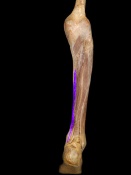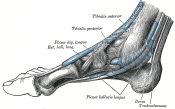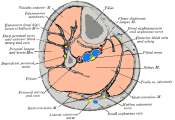Flexor Digitorum Longus
Original Editor - George Prudden
Top Contributors - George Prudden, Kim Jackson, WikiSysop, Abbey Wright, Pinar Kisacik, Patti Cavaleri, 127.0.0.1 and Evan Thomas;
Description[edit | edit source]
The muscle belly is located at the medial and posterior of the calf where is travels down to form a tendon about 3 fingers breath above the medial malleous. The tendon then passes laterally to tibialis posterior tendon where it then situated deep to the flexor retinaculum lying in its own synovial sheath along the medial aspect of the sustentaculum tali. Beyond this point it is difficult to palpate as it enters the sole of the foot deep to the abductor hallucis where is crosses forwards and laterally on the plantar aspect. Halfway along the sole, on the lateral side the tendon merges with flexor accessorius and divides into 4 individual tendons. [1]
Origin[edit | edit source]
Medial and posterior surface of the body of the tibia.
Insertion[edit | edit source]
Plantar surface, base of the distal phalanges of the four lesser digits.
Nerve[edit | edit source]
Tibial nerve (root L5, S1 and S2).
Cutaneous supply on the medial and posterior aspect of the calf and sole from L4, L5 and S1.
Artery[edit | edit source]
Posterior tibial artery[2]
Function[edit | edit source]
Flexes phalanges of second to fifth digits as the foot is raised from the ground. Additionally stabilises the metatarsal heads and keeps distal pads of toes in contact with ground in toe-off and when on tip-toe.[2]
Clinical relevance[edit | edit source]
Assessment[edit | edit source]
Palpation[edit | edit source]
It is near impossible to locate the origin due to it's depth to the soleus muscle. The insertional tendon is also deep but can be identified as it passes alongside the sustentaculum tali.
Power[edit | edit source]
Resisted flexion of second to fifth toes with the foot in neutral or dorsiflexion.
Length[edit | edit source]
Treatment[edit | edit source]
Strengthening[edit | edit source]
Stretching[edit | edit source]
Manual techniques[edit | edit source]
Resources[edit | edit source]

|

|

|
File:FDL4.JPG | 
|
See also[edit | edit source]
- Flexor hallucis longus
- The Os Trigonum Syndrome
- Tarsal Tunnel syndrome
- Posterior Tibial Tendon Dysfunction
- Ankle & Foot
- Compartment Syndrome of the Foot
- Ankle Impingement
- Hallux Valgus
- Ankle Joint
- Congenital talipes equinovarus (CTEV)







